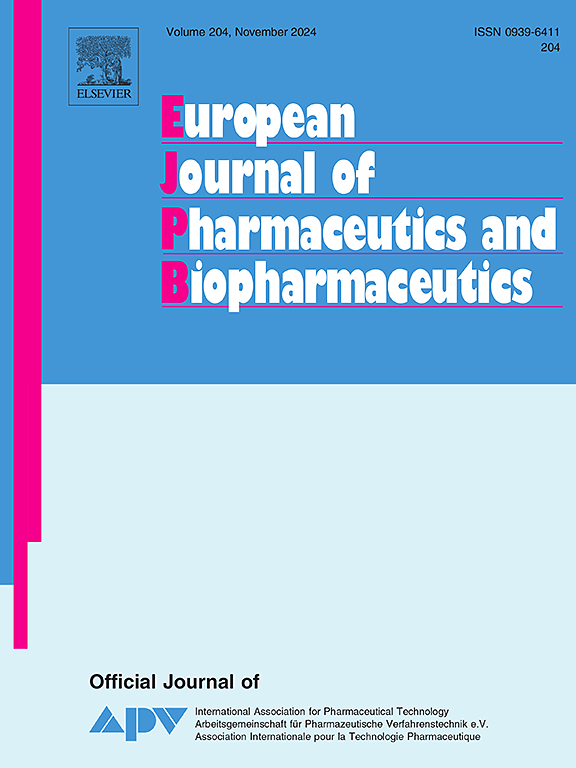Enhancing therapeutic efficacy: In vivo mechanisms and biochemical effects of lycopene encapsulated in nanomicelles for acute inflammation and lipid metabolism
IF 4.3
2区 医学
Q1 PHARMACOLOGY & PHARMACY
European Journal of Pharmaceutics and Biopharmaceutics
Pub Date : 2025-02-01
DOI:10.1016/j.ejpb.2024.114585
引用次数: 0
Abstract
This study focuses on developing, characterizing, and evaluating lycopene nanomicelles formulations for their therapeutic potential in treating acute inflammation and obesity. Lycopene, a hydrophobic carotenoid with potent antioxidant, anti-inflammatory, and anticancer properties, faces challenges in bioavailability due to its poor solubility. To address this, the study utilized nanocarrier systems like liposomes, nanoparticles, and nanoemulsions to enhance the solubility, stability, and bioavailability of lycopene. The lycopene nanomicelles demonstrated significant anti-inflammatory and anticancer activities through multiple mechanisms. It inhibited the NF-κB pathway, reducing the expression of pro-inflammatory mediators, and modulated apoptotic pathways, leading to increased apoptosis and reduced cell proliferation in cancer cells. Furthermore, lycopene enhanced phase II detoxifying enzymes activity, interfered with gap junction communication, and potentially improved DNA repair mechanisms, contributing to its anticancer efficacy. In vivo studies revealed that lycopene nanomicelles effectively reduced leukocyte and neutrophil counts in an acute inflammation model, especially at higher doses, highlighting its potential as a nanodrug for inflammation management. However, the study found no significant alteration in triglyceride levels, indicating a need for further investigation into the effects of lycopene and its nanostructured forms on lipid metabolism. Biochemical analyses showed variations in liver enzyme levels, suggesting protective effects on the liver but also indicating potential pancreatic activity or stress and low glucose levels. These findings underscore the necessity for comprehensive safety evaluations. Overall, this research underscores the promising therapeutic applications of lycopene nanomicelles in inflammation and cancer while emphasizing the importance of addressing safety and metabolic effects for effective clinical translation.

提高治疗效果:纳米胶束包裹的番茄红素对急性炎症和脂质代谢的体内机制和生化作用。
本研究的重点是开发、表征和评估番茄红素纳米胶束制剂在治疗急性炎症和肥胖方面的治疗潜力。番茄红素是一种疏水类胡萝卜素,具有有效的抗氧化、抗炎和抗癌特性,由于其溶解度差,在生物利用度方面面临挑战。为了解决这个问题,该研究利用纳米载体系统,如脂质体、纳米颗粒和纳米乳液来提高番茄红素的溶解度、稳定性和生物利用度。番茄红素纳米胶束通过多种机制显示出显著的抗炎和抗癌活性。抑制NF-κB通路,降低促炎介质的表达,调节凋亡通路,导致癌细胞凋亡增加,细胞增殖减少。此外,番茄红素增强II期解毒酶活性,干扰间隙连接通讯,并可能改善DNA修复机制,有助于其抗癌功效。体内研究表明,在急性炎症模型中,番茄红素纳米胶束有效地降低了白细胞和中性粒细胞计数,特别是在高剂量下,突出了其作为炎症管理纳米药物的潜力。然而,该研究没有发现甘油三酯水平的显著变化,这表明需要进一步研究番茄红素及其纳米结构形式对脂质代谢的影响。生化分析显示肝酶水平的变化,表明对肝脏有保护作用,但也表明潜在的胰腺活动或应激和低血糖水平。这些发现强调了进行全面安全评价的必要性。总的来说,本研究强调了番茄红素纳米微束在炎症和癌症治疗中的应用前景,同时强调了解决其安全性和代谢效应的重要性,以实现有效的临床转化。
本文章由计算机程序翻译,如有差异,请以英文原文为准。
求助全文
约1分钟内获得全文
求助全文
来源期刊
CiteScore
8.80
自引率
4.10%
发文量
211
审稿时长
36 days
期刊介绍:
The European Journal of Pharmaceutics and Biopharmaceutics provides a medium for the publication of novel, innovative and hypothesis-driven research from the areas of Pharmaceutics and Biopharmaceutics.
Topics covered include for example:
Design and development of drug delivery systems for pharmaceuticals and biopharmaceuticals (small molecules, proteins, nucleic acids)
Aspects of manufacturing process design
Biomedical aspects of drug product design
Strategies and formulations for controlled drug transport across biological barriers
Physicochemical aspects of drug product development
Novel excipients for drug product design
Drug delivery and controlled release systems for systemic and local applications
Nanomaterials for therapeutic and diagnostic purposes
Advanced therapy medicinal products
Medical devices supporting a distinct pharmacological effect.

 求助内容:
求助内容: 应助结果提醒方式:
应助结果提醒方式:


